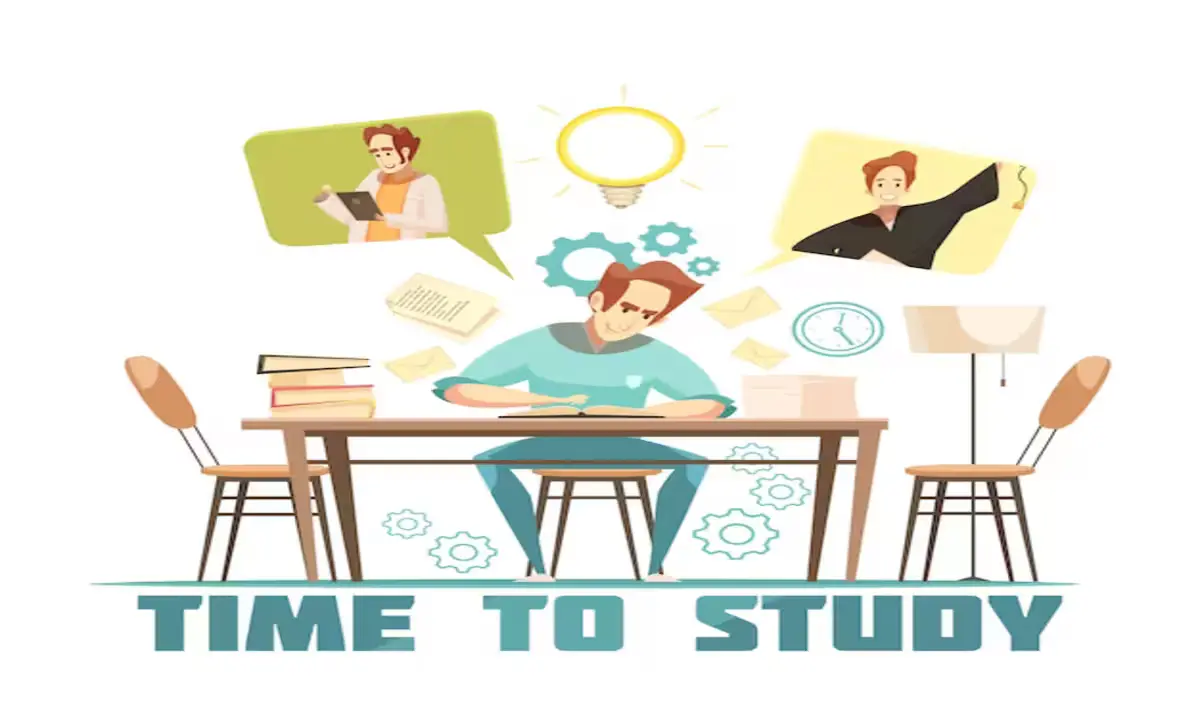In today's fast-paced and ever-changing world, staying ahead of the curve is crucial for success Effective Study. Whether you are a student preparing for exams or a professional trying to enhance your skills, effective study strategies can make all the difference. These strategies not only help you absorb information efficiently but also ensure long-term retention of knowledge. In 2024, as the world becomes increasingly digital and competitive, it is important to equip ourselves with the most effective study techniques to stay ahead.
This article explores ten proven effective study strategies that can help you maximize your learning potential and achieve your goals. By implementing these strategies, you can unlock your full academic or professional potential and embrace the challenges of the future.
Benefits of effective study strategies
Effective study strategies offer numerous benefits to individuals looking to enhance their learning and stay ahead in the fast-paced world of 2024. First and foremost, these strategies help optimize the learning process by allowing individuals to absorb information efficiently. By employing active learning techniques such as flashcards and group discussions, learners engage with the material and enhance their comprehension and retention. Good time management practices ensure that individuals allocate sufficient time for effective studying and avoid last-minute cramming, leading to improved productivity. Effective note-taking strategies aid in organizing and summarizing information, making it easier to review and study.

Utilizing online resources and seeking support from teachers and peers provide additional learning opportunities and clarifications. Finally, mastering exam preparation and test-taking strategies help individuals perform at their best during assessments. By adopting and implementing effective study strategies, individuals can gain a competitive edge and succeed in their academic or professional pursuits in 2024.
Importance of staying ahead in 2024
In the rapidly evolving world of 2024, staying ahead is crucial for success. The constant advancements in technology and shifting job market require individuals to be proactive in their learning and skill development. By staying ahead, individuals can secure better opportunities, adapt to changing circumstances, and remain competitive in their fields. Staying ahead also allows individuals to stay updated with the latest industry trends and developments, giving them an edge over their peers. Moreover, by consistently improving their knowledge and skills, individuals can position themselves for promotions, career advancements, and increased job security. In today's fast-paced world, staying ahead is not just an advantage; it has become a necessity for personal and professional growth.
Setting Goals and Planning
Setting goals and planning are crucial steps in effective studying. By identifying effective study goals, individuals can have a clear direction and purpose in their learning journey. Whether it's mastering a particular subject or achieving a specific grade, setting goals helps individuals stay focused and motivated.
Once goals are established, creating an effective study schedule becomes essential. This schedule ensures that individuals allocate sufficient time for studying and prioritize their tasks accordingly. It helps in breaking down the effective study material into manageable chunks and enables individuals to allocate time for revision and practice. A well-planned study schedule also allows individuals to balance their academic commitments with other responsibilities and activities. By setting goals and creating a study schedule, individuals can effectively manage their time and maximize productivity, leading to better learning outcomes.
Identifying effective study goals
Identifying effective study goals is the first step in effective studying. It involves determining what you want to achieve during your study sessions. Whether it's acing a specific subject, improving your grades, or gaining a deeper understanding of a particular topic, setting clear goals helps you stay focused and motivated throughout your learning journey.
To identify effective study goals, it's important to consider your personal aspirations, academic requirements, and areas of improvement. Reflect on what you hope to accomplish in each subject or topic and set specific, measurable, achievable, relevant, and time-bound (SMART) goals. By defining your study goals, you can have a clear direction and purpose in your studies, allowing you to prioritize your time and efforts accordingly. It's essential to regularly reassess and adjust your goals as needed to ensure continuous progress and growth.
Creating a study schedule
Creating an effective study schedule is crucial for staying organized and maximizing productivity. When creating a study schedule, it's essential to consider your daily routine, commitments, and energy levels. Start by allocating specific time blocks for each subject or topic based on your priorities and effective study goals. Be realistic and ensure you have enough time for breaks and relaxation.
Using a planner or digital calendar can help visualize your study schedule and ensure you stay on track. Additionally, consider incorporating different effective study techniques and varying the subjects to avoid monotony and enhance learning. Regularly review and update your study schedule to adapt to any changes in your routine or coursework. By creating an effective study schedule, you can effectively manage your time, reduce procrastination, and consistently dedicate focused efforts to your studies.
Active Learning Techniques
Active learning techniques are effective ways to engage with and process information actively. Two popular active learning techniques are flashcards and mnemonic devices. Flashcards help in actively recalling information by presenting a question or term on one side and the answer on the other. By repeatedly reviewing and testing yourself with flashcards, you can strengthen your memory and grasp key concepts.

Mnemonic devices, on the other hand, use creative associations or acronyms to aid in memorization. These techniques make learning more interactive and personalized. Another valuable active learning technique is group discussions and teaching others. Explaining concepts to others helps solidify your understanding and allows for collaborative learning. Engaging in active learning techniques promotes deeper understanding, enhances retention, and strengthens problem-solving skills.
Flashcards and mnemonic devices
Flashcards and mnemonic devices are powerful tools for active learning. Flashcards allow students to actively recall information by presenting a question or term on one side and the answer on the other. By repeatedly reviewing and testing themselves with flashcards, students can strengthen their memory and grasp key concepts. Mnemonic devices, on the other hand, use creative associations or acronyms to aid in memorization. These techniques make learning more interactive and personalized. Students can create their own flashcards or use online flashcard platforms to enhance their studying experience. Mnemonic devices can be helpful for memorizing lists, formulas, or complex information. Incorporating flashcards and mnemonic devices into effective study sessions can promote deeper understanding, improve retention, and strengthen problem-solving skills.
Group discussions and teaching others
Group discussions and teaching others are effective study strategies that promote active learning and enhance understanding. Engaging in group discussions allows students to share their knowledge, perspectives, and insights with their peers.
Through the exchange of ideas and discussions, students can gain new insights and reinforce their understanding of the subject matter. Additionally, teaching others is a powerful learning technique as it requires students to explain concepts in their own words, which helps solidify their understanding. By teaching others, students can identify gaps in their knowledge and reinforce their learning. Group discussions and teaching others provide an opportunity for collaborative learning and can boost confidence in one's own understanding. These strategies encourage active engagement and help students develop critical thinking and communication skills.
Time Management and Productivity
Time management and productivity play a crucial role in effective studying. One strategy that can improve both is the Pomodoro Technique. This technique involves working for a set period of time, usually 25 minutes, and then taking a short break. This helps with concentration and prevents burnout. Students can use a timer or productivity apps to track their work intervals.
Another important aspect of time management is eliminating distractions. This can be done by turning off notifications on phones and computers or using website blockers to limit access to social media. Staying organized is also key to productivity. Students can use tools like to-do lists or digital calendars to prioritize tasks and deadlines.
By effectively managing time and staying productive, students can make the most of their study sessions and accomplish more in a shorter amount of time.
Pomodoro Technique for focused studying
The Pomodoro Technique is a widely used time management method that can improve focus and concentration during effective studying. The technique involves breaking down study sessions into timed intervals, typically 25 minutes each, known as "pomodoros." After completing a pomodoro, a short break of around 5 minutes is taken. After completing several pomodoros, a longer break of 15-30 minutes is taken.
This technique helps to maintain focus by providing structured periods of work and rest. It prevents burnout and provides a sense of accomplishment after completing each pomodoro. Students can use a timer or specialized Pomodoro Technique apps to track their work intervals. By implementing the Pomodoro Technique, students can enhance their productivity and make the most of their study sessions.
Eliminating distractions and staying organized
Eliminating distractions and staying organized are crucial aspects of effective study strategies. By minimizing distractions, students can maintain focus and optimize their learning experience. Some practical ways to reduce distractions include turning off notifications on electronic devices, finding a quiet study space, and using website blockers to prevent access to social media or other time-wasting sites. Staying organized is also essential for efficient studying. Students can create a structured study environment by keeping their study materials, notes, and assignments neatly organized. Utilizing tools like folders, binders, or digital note-taking apps can help in maintaining an organized system. By eliminating distractions and staying organized, students can maximize their productivity and create a conducive learning environment.
Effective Note-taking Strategies
Effective note-taking strategies are essential for capturing and retaining important information during effective study sessions. Two effective methods are the Cornell method and mind maps.
The Cornell method involves dividing a sheet of paper into three sections: a narrow left column for cues or questions, a wider right column for notes, and a bottom section for summarizing key points. This method promotes active engagement and increases comprehension.
Mind maps are visual diagrams that help organize information in a structured and interconnected way. They start with a central topic and branch out into subtopics and supporting details. This method stimulates creativity and improves information recall.
Additionally, highlighting and summarizing key points are effective techniques for condensing information and reinforcing understanding. These strategies not only enhance note-taking efficiency but also promote active learning and retention.
Cornell method and mind maps
The Cornell method and mind maps are two effective note-taking strategies that can significantly enhance studying and information retention. The Cornell method involves dividing a sheet of paper into three sections: a narrow left column for cues or questions, a wider right column for notes, and a bottom section for summarizing key points. This structured approach encourages active engagement and improves comprehension by focusing on important information.
On the other hand, mind maps are visual diagrams that help organize information in a structured and interconnected way. They start with a central topic and branch out into subtopics and supporting details. Mind maps stimulate creativity, promote a holistic understanding of the subject matter, and aid in information recall.
By utilizing these note-taking strategies, students can effectively capture and retain information, leading to improved academic performance.
Highlighting and summarizing
Highlighting and summarizing are two effective note-taking strategies that can assist in the review and retention of important information. When reading through textbooks or effective study materials, highlighting key points or important concepts can make them stand out visually, making it easier to review later. It helps to draw attention to the most significant information and serves as a quick reference when studying for exams or writing papers.
Summarizing, on the other hand, involves condensing complex material into concise and easily digestible summaries. By summarizing information in your own words, you engage in a process of active learning and comprehension. It promotes the integration of knowledge and helps in retaining information in long-term memory. Summaries are useful for quick review, as they encompass the main ideas and essential details. Both highlighting and summarizing contribute to efficient studying and reinforcement of important concepts.
Enhancing Memory and Retention
To maximize memory and retention, there are two effective strategies to employ: spaced repetition and interleaving.
Spaced repetition involves reviewing material at gradually increasing intervals over time. By spacing out the review sessions, you reinforce the information and allow for better long-term retention.
Interleaving, on the other hand, involves mixing different topics or subjects together during study sessions. This technique helps create connections between different concepts, enhancing your ability to recall and apply knowledge.
Visualization and association techniques can also aid in memory enhancement. Using mental imagery or creating associations between new information and familiar concepts can improve memory retrieval.
By incorporating these strategies into your effective study routine, you can enhance memory retention and improve your overall learning experience. Practice and consistent application of these techniques will boost your ability to recall information when needed.

Spaced repetition and interleaving
Spaced repetition and interleaving are two effective strategies for enhancing memory and retention. Spaced repetition involves reviewing material at gradually increasing intervals over time. This technique helps reinforce information by allowing for better long-term retention. By spacing out review sessions, you give your brain time to consolidate and strengthen the memory.
On the other hand, interleaving involves mixing different topics or subjects together during study sessions. This approach creates connections between different concepts, enhancing your ability to recall and apply knowledge. Interleaving prevents you from getting too comfortable with one particular topic and promotes better overall learning.
Both spaced repetition and interleaving are backed by research and have been shown to significantly improve memory retention. By incorporating these strategies into your study routine, you can enhance your ability to recall information when needed, and stay ahead in your studies in 2024.
Visualization and association techniques
Visualization and association techniques are powerful tools for enhancing memory and retention. By creating vivid mental images of information, you can improve your ability to recall it later. When studying, try to visualize concepts or ideas as if they were a movie playing in your mind. This can help make the information more memorable and easier to recall during exams or when you need it in the future.
Association techniques involve connecting new information to existing knowledge or creating links between different pieces of information. This helps create a network of associations in your mind, making it easier to retrieve the information when needed. You can use techniques such as creating acronyms, rhymes, or visualizing connections between concepts.
By incorporating visualization and association techniques into your effective study routine, you can boost your memory and retention, leading to better academic performance in 2024.
Utilizing Resources and Support
To stay ahead in 2024, it is crucial to utilize available resources and seek support from others. Online learning platforms offer a wealth of educational resources, such as lectures, videos, and practice exercises, allowing students to supplement their studies and gain a deeper understanding of the subject matter. These platforms also offer interactive forums and study groups, providing opportunities for collaboration and learning from peers.
Additionally, seeking help from teachers and peers can provide valuable insights and clarification on difficult topics. By actively engaging with resources and seeking support, students can enhance their learning experience and overcome any challenges they may face. It is important to take advantage of these resources and create a supportive network to thrive academically in 2024.
Utilizing online learning platforms and resources
Online learning platforms provide a wealth of educational resources that can greatly enhance a student's study experience in 2024. These platforms offer a wide range of materials including lectures, videos, practice exercises, and interactive forums. Students can access these resources at their own pace, allowing them to review and reinforce their understanding of key concepts. Online platforms also provide the opportunity to join effective study groups and collaborate with peers who are studying the same subjects.
This collaborative environment fosters discussions, exchange of ideas, and helps fill any knowledge gaps. Additionally, these platforms often have tools and features that track progress and provide personalized feedback, enabling students to identify areas for improvement and allocate their study time more effectively. By utilizing online learning platforms and resources, students can access a diverse range of materials and support to optimize their learning experience in 2024.
Seeking help from teachers and peers
When facing challenges or needing clarification on certain topics, seeking help from teachers and peers is an important strategy for effective studying in 2024. Teachers possess extensive knowledge and expertise in their subject areas and can provide valuable insights and guidance. They can clarify concepts, provide additional resources, and offer feedback on assignments or study materials.
Peers can also play a significant role in the learning process. Engaging in group study sessions or study groups allows for collaborative learning, where different perspectives and ideas are shared. Peers can explain difficult concepts in a way that resonates with their fellow students, making the learning experience more engaging and interactive. By seeking help from teachers and peers, students can enhance their understanding of the material and gain valuable support during their effective study journey.
Exam Preparation and Test Taking Strategies
Preparing for exams requires a structured approach to ensure maximum effectiveness. Students can start by creating a study plan that outlines the topics to be covered and allocates specific time slots for each subject. This helps in managing time efficiently and avoids last-minute cramming.
Additionally, practicing previous exam papers and mock tests allows students to familiarize themselves with the exam format and identify areas that need improvement. It is crucial to manage exam anxiety by practicing stress-relieving techniques such as deep breathing and positive affirmations. On the day of the exam, it is important to read and understand the instructions carefully, allocate time for each question, and prioritize answering easier questions first. By implementing these strategies, students can boost their confidence and achieve better results in exams.
Creating a study plan for exams
Creating a study plan for exams is essential for effective preparation and optimal performance. It helps students stay organized and ensures that all topics are covered adequately. To create a study plan, students should start by prioritizing subjects based on their difficulty level and the weightage of marks in the exam. They can allocate specific time slots for each subject, keeping in mind their personal preferences and energy levels throughout the day.
It is essential to break down each subject into smaller topics and allocate dedicated study time for each one. This allows students to have a clear roadmap and ensures that all areas are covered. Additionally, setting aside time for practicing previous exam papers and taking mock tests can help students familiarize themselves with the exam format and identify any areas that require further attention. By following a study plan, students can manage their time effectively, reduce anxiety, and improve their overall exam performance.
Managing exam anxiety and practicing effective test-taking strategies
Managing exam anxiety and practicing effective test-taking strategies are crucial components of exam preparation. To manage exam anxiety, students can employ various techniques, such as deep breathing exercises, positive self-talk, and visualization. They can also develop a study routine to ensure that they are adequately prepared and confident. On the day of the exam, it is essential for students to arrive early, read the instructions carefully, and plan their time wisely. They should start with the easier questions to build momentum and tackle the more challenging ones later. It is also beneficial to review answers before submitting the exam. By implementing these strategies, students can reduce anxiety, stay focused, and perform to the best of their abilities during exams.
Overcoming Procrastination and Motivation
Procrastination is a common challenge faced by students, but it can hinder progress and lead to unnecessary stress. To overcome procrastination, students can start by identifying their procrastination habits and understanding the reasons behind them. Setting small, achievable goals can help break tasks into manageable chunks, making them less overwhelming. Creating a specific and realistic study plan with deadlines can also provide structure and accountability. Additionally, removing distractions, such as turning off notifications or studying in a quiet environment, can help maintain focus.
Maintaining motivation throughout the effective study process is equally important. Students can stay motivated by reminding themselves of their long-term goals, rewarding their progress, and seeking support from friends or family. They can also find inspiration from successful individuals who have achieved similar goals. By implementing these strategies, students can overcome procrastination, stay motivated, and make significant progress in their studies.
Identifying and overcoming procrastination habits
Identifying and overcoming procrastination habits is crucial for effective studying. Students can begin by recognizing the patterns and triggers that lead to procrastination. This may involve reflecting on their behaviors, such as constantly checking social media or engaging in non-essential tasks instead of studying. They can also consider the underlying reasons behind their procrastination, such as fear of failure or difficulty in starting a task.
Once these habits are acknowledged, students can develop strategies to overcome them. This may include breaking tasks into smaller, more manageable portions, setting specific deadlines, or seeking accountability from a study partner or mentor. Additionally, creating a structured and organized environment can help minimize distractions and maintain focus. By identifying and addressing their procrastination habits, students can improve their productivity and achieve academic success.
Keeping motivation high during the study process
To keep motivation high during the study process, students can employ various strategies. One effective approach is to set realistic and attainable goals. By breaking down larger tasks into smaller, manageable ones, students can experience a sense of accomplishment along the way, fueling their motivation. It can also be helpful to celebrate milestones to stay motivated. Creating a positive and conducive study environment is vital as well. Ensuring a comfortable and well-lit space, free from distractions, can promote focus and motivation.
Additionally, finding study techniques that align with personal learning styles can make studying more engaging and enjoyable. Finally, seeking support from peers, mentors, or online communities can provide motivation, encouragement, and a sense of accountability. By implementing these strategies, students can maintain their motivation throughout the effective study process.
Conclusion
In conclusion, effective study strategies are crucial for staying ahead in 2024 and achieving academic success. Setting goals and planning help students prioritize their effective study time and stay organized. Active learning techniques, such as flashcards and group discussions, enhance understanding and retention of information. Implementing time management techniques like the Pomodoro Technique and eliminating distractions improve productivity.
Note-taking strategies like the Cornell method and highlighting aid in information recall during exams. Enhancing memory and retention through spaced repetition and visualization techniques further support learning. Utilizing resources, seeking support, and practicing effective test-taking strategies are invaluable in exam preparation. Overcoming procrastination and maintaining motivation are essential for consistent study habits. By implementing these strategies, students can maximize their learning potential and thrive in their studies in 2024.
Recap of effective study strategies
In this fast-paced and competitive world, staying ahead requires effective study strategies. By setting goals and creating a study schedule, students can prioritize their time and stay organized. Active learning techniques like using flashcards and engaging in group discussions enhance understanding and retention of information. Time management techniques, such as the Pomodoro Technique, help students stay focused and productive.
Effective note-taking strategies like the Cornell method and highlighting aid in information recall during exams. Enhancing memory and retention through spaced repetition and visualization techniques further support learning. Utilizing online resources and seeking support from teachers and peers are invaluable. Lastly, practicing effective test-taking strategies and maintaining motivation are crucial in exam preparation. Incorporating these strategies will empower students to excel in their studies in 2024.
Encouragement to implement these strategies in 2024
Implementing these effective study strategies in 2024 will undoubtedly provide students with the tools they need to excel academically. By setting clear goals and creating a study schedule, students can prioritize their time and stay organized. Active learning techniques like using flashcards and engaging in group discussions will enhance their understanding and retention of information. Effective time management techniques, such as the Pomodoro Technique, will help students stay focused and productive.
Utilizing note-taking strategies and memory-enhancing techniques will further support their learning. By utilizing online resources and seeking support from teachers and peers, students can access valuable information and guidance. Practicing effective test-taking strategies and maintaining motivation will ensure success in exams. Let's embrace these strategies and pave the way for a successful effective study journey in 2024.



You must be logged in to post a comment.